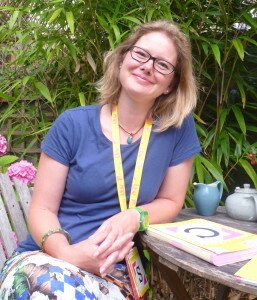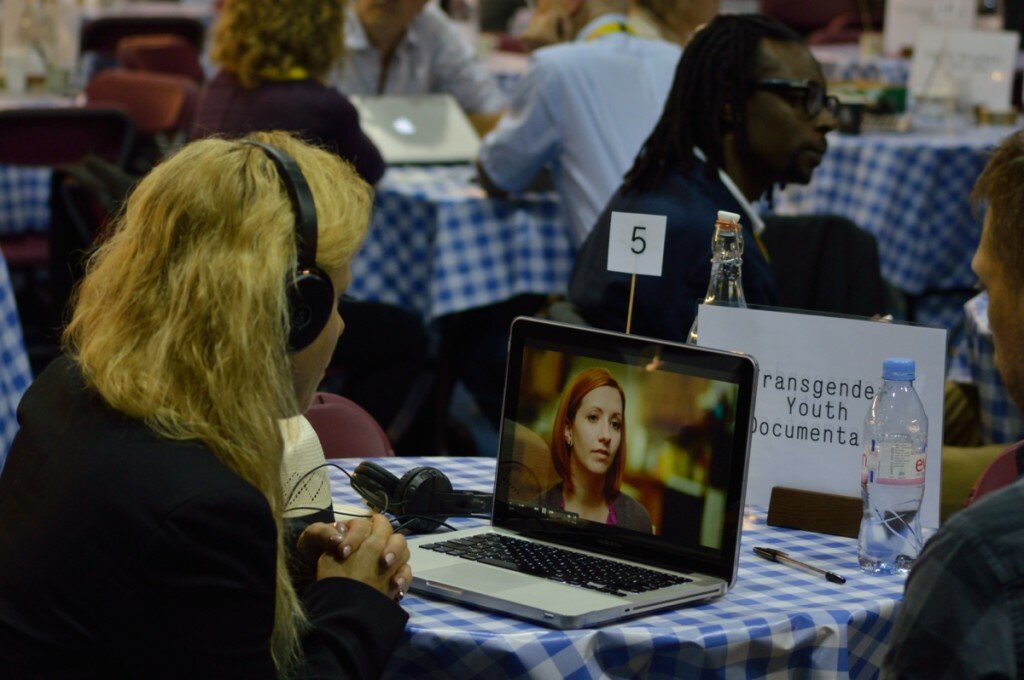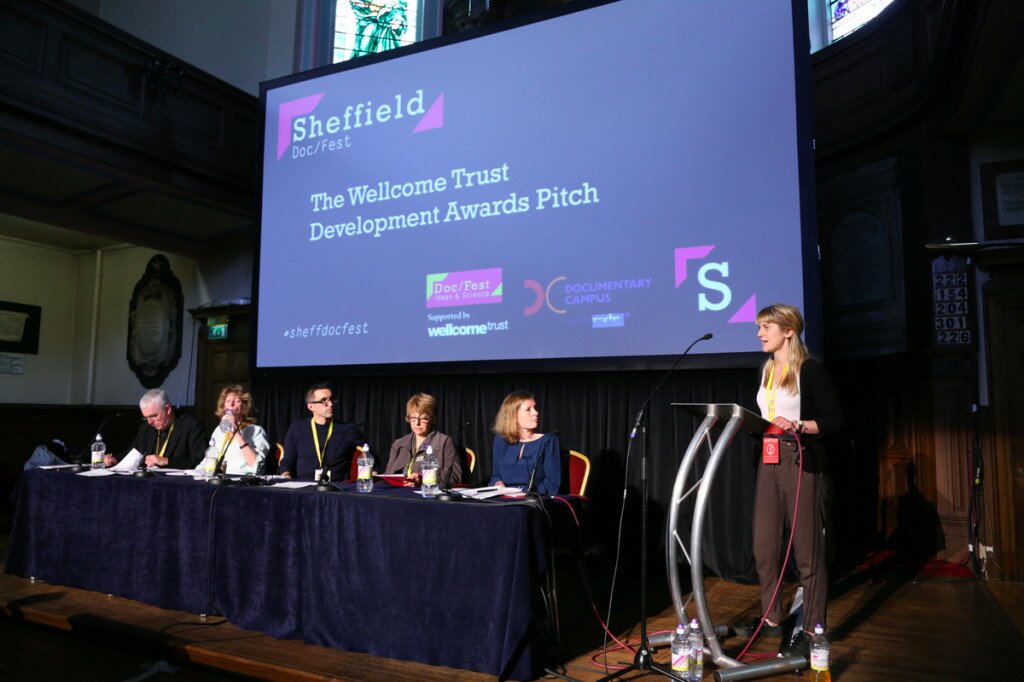Commissions
Pitch Forth!

Writer/Director Stephanie Wessell
In January 2014, Writer and Director Stephanie Wessell started on Sheffield Doc/Fest’s mentoring scheme, Fast Track To Features. Beginning with a relatively undeveloped idea at the time, she nonetheless progressed through the selective stages of the scheme to reach the final six and publicly pitch what is now a project-in-development, at the festival in June. These are her thoughts about generally pitching a project at Sheffield.
If you think about the word ‘pitch’ – you know, really think about it – it aptly describes the tremendous leap of faith you have to make. You’re aiming to throw that precious baby you’ve spent months, even years, developing into a room full of strangers, many of them distracted by the other babies in the room, hoping they’ll catch and nurture it? Come on, most of those people don’t know you or your project from the hundreds of other hopefuls here. Why should they care? Are you joking? Etc.
But a prerequisite to getting your project heard about, advised upon, and ultimately funded and made is to get it under the right noses, in the right way. Make them care about your baby! It’s a tough task… and one I was undertaking for the first time, at Sheffield Doc/Fest 2014.
Sheffield is one of the key global marketplaces for independent documentaries. Over 3000 delegates are vying to meet 300 ‘decision makers’ (commissioners, funders, distributors, buyers, execs, etc) from 27 countries, in a marathon of pitching, persuading, listening, learning, watching, considering and, yes, I’ll admit it, partying.
I was pitching a documentary and drama hybrid that’s in the very early stages of development. I wanted to make contacts to help me learn, and develop my project, as much as fund it. Armed with training and advice from two schemes I was attending (Women in Film and Television’s Mentoring Scheme, and Sheffield Doc/Fest’s own Fast Track To Features), I headed to Sheffield with my producer Fleur Jago. We were determined to throw our baby into as many rooms as possible… so how should virgin pitchers approach Sheffield?
Be prepared
Easier said than done when there are only 24 hours in a day, but preparation really is key. Devour the Doc/Fest website to make sure you get the head’s up on all opportunities – many need to be applied for well in advance. Develop your project as much as you can. Practice your pitch in all forms and lengths. And remember to bring with you:
1) A Producer
You can be a director of a project heading to Doc/Fest without a producer (and vice versa), but it’s harder work. A fellow team member not only helps you hone your pitch and, obviously, your project, but also eases the strain once you’re at the festival, especially if you get into the intensive Meet Market sessions (see later).
Setting up meetings, talking, describing and persuading (not to mention listening and note-taking) is exhausting… and inevitably you’ll have good and bad meetings, as well as some meetings that tend towards producing advice and others that tend towards directing advice. With a buddy beside you you’re doubling your energy and support resources, and your project is stronger and more purposeful.
If you haven’t been lucky enough to find a good producer, don’t fret: the festival offers chances to meet them, too.
2) A One-pager
My one pager could have been improved with the addition of pictures (I learnt this during Sheffield) but otherwise it was great to be able to easily hand over a brief paper/emailed description of my project. A good one pager includes a log line, a brief synopsis of the plot and characters, key staff, proposed budget and what stage of production you’re at. And don’t forget the contact details!
Decision makers used our one pager either as a reminder of our project or to pass to colleagues who would be more suited to our kind of film.
3) A Teaser Trailer.
My one minute teaser trailer was well filmed, acted and edited by my team, but was shot without a budget in the very early stages of thinking about the project – hence it wasn’t in the style of how my finished film will be. Showing it, with provisos, impressed some decision makers but turned off others… so the jury’s still out on whether it was a good idea to take it and show it. I’d say it was better to have than not: it showed I can direct, and that this is a real project with intention behind it. But next time I’ll shoot a trailer more in keeping with my vision.
Remember to bring headphones for those impromptu viewings in busy bars.

Photo by John Erik Taylor (courtesy of Sheffield Doc/Fest)
4) A Hit-list
Once you’ve signed up as a delegate, you have access to the photos and details of 300 decision makers. Figuring out who you’d like to meet is hard, but the Doc/Fest staff can help you pinpoint who might be most useful/amenable to your project. I’d say around 20 – 30 is a manageable number.
Print out the experts’ details and put them in a folder. Read about their backgrounds and projects, and then email them with details of your project and a link to your trailer or website, requesting a meeting. They won’t all reply, but some will be happy to meet at the festival and offer advice.
You might just bump into others, and strike up conversations – these are sometimes the best kinds of meeting. I sat next to one of our US targets on the coach going to an outdoor screening at Chatsworth: we agreed not to talk about my project there and then (it was nearing the end of the festival and we were both pitched out), but I hope that when I contact her later she’ll remember me as the amiable seat buddy who told her all about the delights of Somerset scrumpy.
5) Business cards
Come on, you know this. Enough said.

What to apply for
Months before the festival starts it’s well worth looking at the various training and mentoring schemes that Doc/Fest provides: Future Producer School, Devise To Deliver, Fast Track To Features… all offer mentoring and training in the run-up to the festival.
I was accepted onto Fast Track To Features and it was invaluable for contacts and insider knowledge about how the industry works, how to develop my pitch, and who to aim it towards. It also gave me the opportunity to win a place in the final, public, Fast Track To Features Showcase Pitch (see my other article here).
In terms of the festival itself, there are more pitching opportunities than you can shake a well-written one pager at. Including:
1) Meet Market
THE key place to formally meet decision makers and pitch your project one-to-one. It’s terribly competitive with over 650 applications for just 64 places, but if you get selected you can cherry-pick interested decision makers and have meetings organized for you. It takes place over two intensive days: another reason to have a fellow team member pitching with you, to ease the load

MeetMarket by Ric Jones (courtesy of Sheffield Doc/Fest)
2) The Specials Board
If you’re just outside of the few selected for Meet Market you might be selected for one of 40 or so places on this instead – as I was. This means that those 300 decision makers have your project details and trailer at their fingertips, but you need to organize the meetings yourself (the Doc/Fest staff can help with contact details). It’s an extra cherry on your cake when requesting meetings – a festival endorsement that suggests you’re worth talking to.
3) Mini Meet Market
A more informal way to get pitching and development tips on your project, and especially good for new and emerging filmmakers. Executive producers meet small groups of filmmakers to hear about their projects and offer advice.
4) Crossover Market
29 digital projects were selected for this. It’s a similar set-up to Meet Market, but for digital, transmedia projects. Again, it’s exhausting, so try to bring another team member.
5) Round Tables
We found these especially useful. The Round Tables aren’t specific pitching opportunities, but they allow you to meet decision makers and get their contact details to follow up later. Approximately six decision makers individually rotate around tables of collected filmmakers, spending 15 minutes with each table.

Photo by John Erik Taylor (courtesy of Sheffield Doc/Fest)
Round Tables are informal yet targeted Q and A, with sessions focusing on different parts of the industry. Fleur and I attended the Funds and Foundations, and Feature Docs Round Tables, and came away with some good encouragement for our project as well as heightened knowledge of what we need to apply for particular funds or submit to commissioners. Sales Sunday is particularly useful for those with later stage projects, seeking distribution.
6) Power Hours and Meet…
These sessions are bookable, brief, one-to-one meetings, again focusing on particular areas within the documentary industry. We did Arts and Culture and Diversity Power Hours, while our Meet The BFI was very useful for starting to get a grip on tax issues.
7) Public pitches
Some of these have funding attached, others don’t. They all offer a great opportunity to pitch in front of a distinguished panel of decision makers and an audience, and offer kudos if you win.

Wellcome Trust Pitch by Jacqui Bellamy (courtesy of Sheffield Doc/Fest)
If you don’t win it’s still good: the fact you got a place to pitch at all means your project has legs, and there will be more eyes and ears on your project here than in any one-to-one meeting. It’s also a great chance to learn directly from the experts. Who knows, even if the panel offer nothing but negative feedback, there may be someone in the audience who is just itching to fund you or help in some way. The winner of the pitching showcase I took part in was approached by an audience member with a useful offer, after her pitch.
Pitches in 2014 included BBC Fresh, BFI Film Fund, Channel 4 First Cut, The New York Times Ob Docs, the Ramillas Sheffield Interactive Fund, the Soundology Breakthrough, the Vice Rule Britannia, Wellcome Trust, Zero-budget, 10×10, Academic, and the Fast Track To Features Showcase.
8) Informal chats
You never know who you’ll find yourself next to in a film viewing, panel talk, bar or café. Experts are often happy to chat with you after they’ve given an inspiring panel, and the friendly atmosphere of Sheffield Doc/Fest fosters all kinds of relaxed introductions and discussions.

Stephanie Wessell and broadcast journalist Lisa Francesca Nand (photo (C) TVMole)
Keep your chat light, relaxed and mutually beneficial. Know about your target’s work, and tell them why you admire it. Decision makers are people after all, not machines for you to throw your pitch at for instant feedback.
But if they ask, it’s helpful to be able to succinctly and entertainingly deliver a brief elevator pitch. I’ve heard apocryphal tales of people winning commissions when standing next to someone on the train platform, waiting to return home, and another friend of mine really was asked to deliver a pitch in his hotel lift!
The main thing to remember in all of these pitching scenarios is that pitching is like dating. Think of these meetings as you might for a first date: you’re likely to need much more than a single chat before either side contemplates marriage. Just get the relationship going, and see where it leads in the fullness of time.
So how did our baby do?
We came away from Doc/Fest exhausted and with no commissions or money. But we accumulated plenty of contacts and started forging relationships that we hope to develop and go back to later. We feel better informed about the funding we need to explore, and we have new ideas about how to progress our project further.
Personally, pitching my project at a festival has honed my direction and my confidence. The experience developed my film idea into a real entity, now existing in the world rather than just living in my head. Sheffield Doc/Fest has helped my baby start to grow up.
Read how Stephanie got on in her Fast Track to Features pitch here.


Discussion
Comments are disallowed for this post.
Comments are closed.